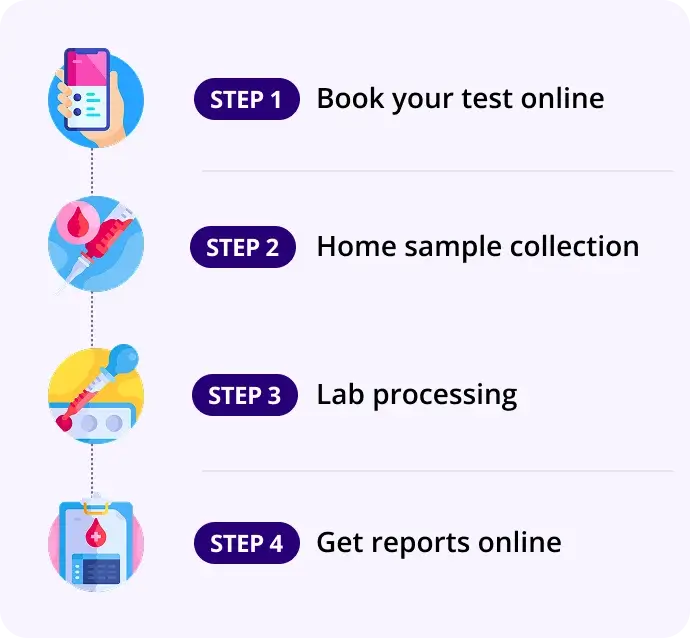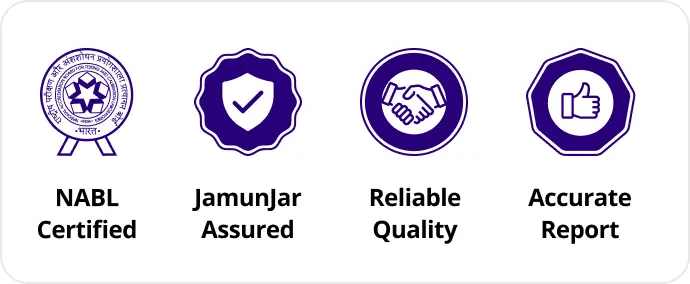Search for
24 hour Albumin creatinine ratio (ACR)
Kidney
Report in 4Hrs
At Home
No Fasting Required
Details
Quantifies albumin-to-creatinine ratio in urine to detect early kidney damage, especially in diabetics.
₹649₹900
28% OFF
FREE:
Ai Insights
24-Hour Albumin Creatinine Ratio (ACR) Test Guide
- Why is it done?
- Test Purpose: Measures the amount of albumin (protein) lost in urine over a 24-hour period relative to creatinine levels, detecting early signs of kidney disease
- Screening for Diabetic Nephropathy: Primary indicator of kidney damage in patients with diabetes mellitus
- Monitoring Kidney Function: Assessment and progression tracking in patients with chronic kidney disease or hypertension
- Risk Stratification: Identifies patients at increased risk of cardiovascular disease and progressive renal failure
- Typical Indications: Type 1 or Type 2 diabetes, hypertension, family history of kidney disease, annual screening in high-risk populations, and baseline assessment before starting nephrotoxic medications
- Normal Range
- Normal (Negative) ACR: Less than 30 mg/24 hours (or <30 mg/g creatinine in spot samples)
- Microalbuminuria (Early Stage): 30-300 mg/24 hours (or 30-300 mg/g creatinine) - indicates early kidney damage
- Macroalbuminuria (Advanced Stage): Greater than 300 mg/24 hours (or >300 mg/g creatinine) - indicates significant kidney dysfunction
- Units of Measurement: mg/24 hours or mg/g creatinine (depending on specimen type)
- Interpretation Summary: Normal results indicate no significant proteinuria and healthy kidney function; microalbuminuria suggests early disease requiring intervention; macroalbuminuria indicates advanced kidney disease requiring aggressive management
- Interpretation
- ACR <30 mg/24 hours: Normal - Kidney function is adequate; no albuminuria present; associated with low risk of progressive kidney disease
- ACR 30-300 mg/24 hours: Microalbuminuria - Earliest detectable sign of kidney damage; often reversible with appropriate treatment (tight glycemic control, ACE inhibitors/ARBs, blood pressure management); indicates increased cardiovascular risk
- ACR >300 mg/24 hours: Macroalbuminuria - Significant kidney disease present; indicates substantial glomerular damage; associated with rapid progression to end-stage renal disease; requires intensive treatment
- Factors Affecting Results: Acute illness or infection, intense exercise, urinary tract infection, menstruation, fever, recent blood glucose fluctuations, improper collection technique, dehydration status, and certain medications (NSAIDs, diuretics)
- Clinical Significance: Albuminuria is an independent predictor of cardiovascular events and mortality; presence indicates endothelial dysfunction; used to stage chronic kidney disease and guide treatment intensity; helps distinguish diabetic from non-diabetic kidney disease
- Pattern Recognition: Increasing values over time suggest progressive disease; stable values indicate disease plateau; declining values may indicate treatment response or improved kidney function
- Associated Organs
- Primary Organ System: Kidneys (glomeruli and renal filtration system) - albuminuria reflects damage to the glomerular filtration barrier
- Secondary Organ Involvement: Endothelial system, pancreas (in diabetes), cardiovascular system, and other microvasculature
- Conditions Associated with Elevated ACR: Type 1 diabetes, Type 2 diabetes, hypertension, glomerulonephritis, lupus nephritis, IgA nephropathy, polycystic kidney disease, chronic pyelonephritis, post-streptococcal glomerulonephritis
- Diseases Diagnosed or Monitored: Diabetic nephropathy, hypertensive kidney disease, chronic kidney disease (all stages), acute kidney injury progression, nephrotic syndrome, end-stage renal disease risk assessment
- Potential Complications: Progressive decline in glomerular filtration rate (GFR), development of nephrotic syndrome, hypertension progression, cardiovascular disease, myocardial infarction, stroke, peripheral vascular disease, progression to dialysis-dependent renal failure
- Associated Systemic Manifestations: Edema, anemia (from decreased erythropoietin), metabolic acidosis, electrolyte imbalances, bone disease, and accelerated atherosclerosis
- Follow-up Tests
- If ACR is Abnormal: Serum creatinine, estimated glomerular filtration rate (eGFR), blood urea nitrogen (BUN), serum electrolytes (sodium, potassium, phosphorus), serum albumin and total protein
- Complementary Investigations: Urinalysis with microscopy (for casts and cells), uric acid, lipid panel, fasting glucose or HbA1c, blood pressure monitoring, renal ultrasound (for structural abnormalities)
- Advanced Investigations for Persistent Elevation: Renal biopsy (if diagnosis uncertain or atypical presentation), serology testing (ANA, complement levels, ANCA), immunoglobulin quantification, renal artery duplex ultrasound
- Monitoring Frequency: Normal ACR - annually or every 2 years in diabetes; Microalbuminuria - every 3-6 months; Macroalbuminuria - every 3 months or more frequently if declining; Baseline tests should be repeated within 1-2 weeks to confirm results (reduce false positives)
- Treatment Response Monitoring: Repeat ACR testing 3-4 months after initiating ACE inhibitor or ARB therapy; assess for reduction in albuminuria indicating medication efficacy
- Related Tests Providing Complementary Information: Spot urine albumin-to-creatinine ratio, 24-hour urine protein, cystatin C, beta-2 microglobulin, urinary kidney injury biomarkers
- Fasting Required?
- Fasting Requirement: NO - Fasting is not required for 24-hour urine albumin creatinine ratio testing
- 24-Hour Collection Instructions: Begin collection by emptying bladder in morning and discarding urine; collect all subsequent urine for next 24 hours; end collection by emptying bladder exactly 24 hours after starting time; maintain urine in refrigerated container
- Dietary Considerations: Maintain normal diet and hydration; avoid excessive protein intake day before and during collection; excessive sodium intake may increase results; normal salt intake is acceptable
- Medications and Substance Avoidance: Continue all regular medications unless instructed otherwise; avoid NSAIDs 48 hours before collection if possible; avoid excessive caffeine and alcohol (may affect hydration); do not take diuretics unless medically necessary
- Special Patient Preparation: Schedule collection when not ill or febrile (postpone if acute infection present); avoid strenuous exercise 48 hours prior; avoid collection during menstruation or within 3 days after menstruation; ensure clean catch technique if urinary tract infection suspected
- Collection Container Requirements: Use sterile container provided by laboratory; some labs provide containers with preservative (boric acid); must be kept refrigerated or on ice during collection; return to laboratory immediately after collection
- Documentation Requirements: Record exact start and end times; verify total collection volume; note any collection errors or missed portions; report recent urinary tract infections or abnormal urinary symptoms
How our test process works!

